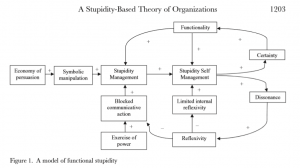TSElosophers meeting 25.2.2020. Ekaterina Panina, Kai Kimppa, Kari Lukka, Milla Wirén, Mohamed Farhoud, Morgan Shaw, Otto Rosendahl
Tourish, D. (2019). The triumph of nonsense in management studies. Academy of Management Learning & Education.
Summary
Tourish approaches his own scientific discipline with an admirable dose of self-reflexivity. He particularly draws attention to the existence of a notable amount of nonsense in management studies publications. TSElosophers interpreted the article as a criticism of the academic publication system in general. We could even consider whether management, at least in the kind of critical analysis that Tourish undertakes here, may be ahead of some other disciplines. To what extent does self-reflexive communication improve the intellectual integrity and societal responsibility of a particular discipline, and thereby indicate that it is in fact in a healthy condition?
This article lists several issues in the publishing process. Often, Tourish argues, the style of writing is too complicated and contains pointless and artificial ‘theorising’. Authors needlessly complicate their language to create an impression of sophistication and theory development at an advanced level. This largely results from the theory contribution requirements of top journals, which are then mimicked by other less-influential journals in the forlorn hope of improving their reputation and ranking.
Furthermore, the rules-of-the-game oblige reviewers to offer suggestions for improvement which authors then feel obliged to follow, whether they truly make sense or not for their piece. The result is often dysfunctional, as the publishing process drags on for years and further drafts become increasingly nonsensical, with too many ideas packed into the same article. All this has become ‘the normal’, i.e., it has become naturalised in the academe.
TSElosophers agree that the measure of success for academics is moving away from communicating ideas with clarity and towards merely getting more and more publications. We discussed whether or not academics these days can escape the publication game as long as they do not yet have tenure. Firstly, those not playing the publication game are at risk of losing their research positions to those who are. Secondly, supervisors often feel obliged to help the careers of their students by teaching them the publication game, which encourages publication efficiency but risks the underlying assumptions of this research approach being accepted uncritically. Finally, it seems implausible that researchers who win tenured positions through success in the publication game will flexibly change their focus towards fixing problematic aspects of a system that has so far rewarded them.
Although we considered Tourish’s article relevant and well-written, we also noticed some shortcomings. For example, the article concentrates on symptoms without providing a compelling overall diagnosis. We would argue that the central issue is that instrumentalism in publishing has become too widespread and self-reinforcing. A major underlying explanatory factor for this might be the expectation to publish too many studies, which many of us do our best to respond to in a constant rush of cranking out research manuscripts one after another.
Additionally, the article seems to conflate grand theories with bad theories, despite correctly identifying grand theories as a major foundation upon which some construct nonsensical abstractions. Tourish contends that the “endless elaboration of distinctions” (Mills 1959) within grand theories takes practitioners too far away from a logical route between theorizing and making observations. However, the examples of grand theories he presents are either cherry picked or misrepresented. He refers to Mills’ (1959) efforts at translating the work of Talcott Parsons, which demonstrated that 555 pages of Parsons’ academese could be written in 150 pages of simpler prose. Ironically, these concerns could be countered by referring to a student of Parsons, Niklas Luhmann, who created a (densely written) grand theory that highlights observation as its central concept and a starting point for making distinctions.
TSElosophers also disagreed on the representation of Lacan’s grand theory as innately nonsensical. First, the article defers to Chomsky as an authority figure to create a bias against Lacan. While Chomsky does have a point in criticizing language made complex in order to appear more academic than it is, both Tourish and Chomsky seem to find text that is actually quite understandable, if one has actually read Lacan, to be problematic. Tourish’s article seems to argue that reference to Lacan in any management article is nonsensical, even though the texts chosen actually are relevant (although of course one can then dispute whether the application of Lacanian theory is justified in this case). Interestingly, Tourish considers non-Lacanian parts of the article to be brilliant and fascinating, but does not elaborate on why insights taken from reading Lacan could not have helped to construct these other parts. Unfortunately this is not the only instance in which Tourish does not seem to understand that using difficult but rigorous concepts is sometimes necessary in order to avoid misunderstandings brought about by the unrelated connotations concepts may have in every-day language.
Tourish concludes with an appealing message. He reminds us of our continued agency within the publication system. For instance, we are not at the mercy of any particular journals. We do not need to accept review processes that confuse our key ideas and arguments, as there are other journals, book publishers and niche strategies for surviving, or even flourishing in academe. At times, it might be better to publish in new and less acknowledged venues in order to change the field for the better. Who knows, these venues might be the ones making a difference for the better in the future. Tourish concludes with a positive message encouraging us to write with “a little more humour, curiosity and passion”, something with which we were all happy to agree.
